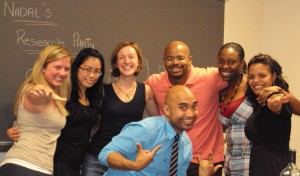 You know the old saying, “it’s not what you know, it’s who you know” that is the key to success. Well, researchers at Carnegie Mellon University have recently published findings in Science magazine that confirm this old adage. In school we always wanted the “brainy” kid to be our lab partner right? In the job world, we always seek to engage the smartest/most experienced people to work on our project team. The thinking being that having the smartest people in our work groups would ensure a good grade or superior job performance. But it seems that intelligence is not the essential ingredient to success in the group format. Rather, it is social sensitivity – the ability to pick up on emotional clues from others – that makes for the most effective groups. Read a good synopsis of the findings of this fascinating study that was published here in Wired magazine. Remember it when your employer asks you to team up with others to handle a task or project.
You know the old saying, “it’s not what you know, it’s who you know” that is the key to success. Well, researchers at Carnegie Mellon University have recently published findings in Science magazine that confirm this old adage. In school we always wanted the “brainy” kid to be our lab partner right? In the job world, we always seek to engage the smartest/most experienced people to work on our project team. The thinking being that having the smartest people in our work groups would ensure a good grade or superior job performance. But it seems that intelligence is not the essential ingredient to success in the group format. Rather, it is social sensitivity – the ability to pick up on emotional clues from others – that makes for the most effective groups. Read a good synopsis of the findings of this fascinating study that was published here in Wired magazine. Remember it when your employer asks you to team up with others to handle a task or project.  You know the old saying, “it’s not what you know, it’s who you know” that is the key to success. Well, researchers at Carnegie Mellon University have recently published findings in Science magazine that confirm this old adage. In school we always wanted the “brainy” kid to be our lab partner right? In the job world, we always seek to engage the smartest/most experienced people to work on our project team. The thinking being that having the smartest people in our work groups would ensure a good grade or superior job performance. But it seems that intelligence is not the essential ingredient to success in the group format. Rather, it is social sensitivity – the ability to pick up on emotional clues from others – that makes for the most effective groups. Read a good synopsis of the findings of this fascinating study that was published here in Wired magazine. Remember it when your employer asks you to team up with others to handle a task or project.
You know the old saying, “it’s not what you know, it’s who you know” that is the key to success. Well, researchers at Carnegie Mellon University have recently published findings in Science magazine that confirm this old adage. In school we always wanted the “brainy” kid to be our lab partner right? In the job world, we always seek to engage the smartest/most experienced people to work on our project team. The thinking being that having the smartest people in our work groups would ensure a good grade or superior job performance. But it seems that intelligence is not the essential ingredient to success in the group format. Rather, it is social sensitivity – the ability to pick up on emotional clues from others – that makes for the most effective groups. Read a good synopsis of the findings of this fascinating study that was published here in Wired magazine. Remember it when your employer asks you to team up with others to handle a task or project. 3 Responses to “It’s Not What You Know, It’s How Well You Interact”
Leave a Reply

Speaking from the perspective of being the brainy kid in high school, people often wanted to work on class projects with me. I found it difficult to correlate with them when they did not actively participate on the assignment. When we interacted well as a team, we achieved more productive results.
I totally agree with the idea that it is how you interact with people in any given situation can insure success. All through school and in my life since, I always have gotten along with most people. People always knew that I would get the job done. I worked ‘with’ people even as a supervisor. It’s all about team work. When we can get along and relate with our co-workers no matter the task at hand, we achieve more positive results.
I fully agree with the idea of interaction with collegues and co- workers to complete any assignment successfully because unity is strength, without interaction and social sensibility falls us apart.